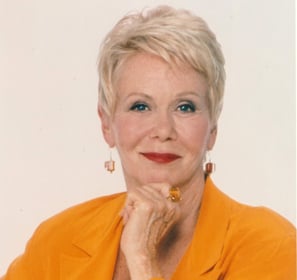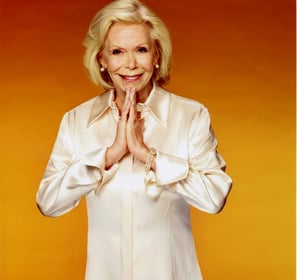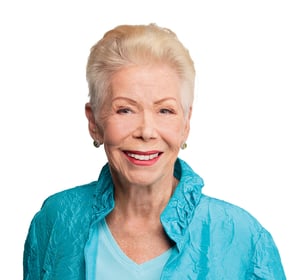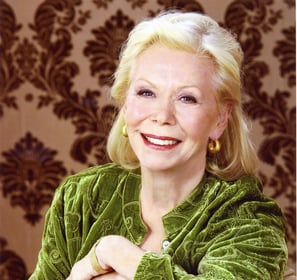



💫 Who Was Louise Hay
Louise Lynn Hay (October 8, 1926 – August 30, 2017) was a motivational author, speaker, and founder of Hay House, a leading publisher in self-help and spirituality. Born in Los Angeles, California, she faced a traumatic childhood with physical and sexual abuse, poverty, and abandonment. At 15, she ran away from home; at 16, she gave her daughter up for adoption. After a failed marriage in the 1970s, she studied at the First Church of Religious Science in New York, becoming a licensed minister and developing the belief that thoughts shape reality. Her book "You Can Heal Your Life" (1984) sold over 50 million copies and was translated into more than 40 languages, establishing her as a pioneer of the self-help and New Thought movement.
💫 Healing Philosophy
Hay's philosophy centers on the connection between mind, body, and spirit, suggesting that negative emotional patterns contribute to physical illnesses. Her practices include:
Positive Affirmations: Repeated statements to reprogram subconscious beliefs.
Forgiveness: Releasing resentments to promote inner peace.
Self-love: Cultivating self-acceptance to transform life.
Her book "Heal Your Body" lists diseases with emotional causes and corresponding affirmations, such as "I love and approve of myself" for general health issues. The methodology, with nearly 50 years of impact since 1976, is practical and accessible, attracting millions globally.
💫 Interesting Facts and Legacy
Personal Triumph: Diagnosed with cervical cancer in the 1970s, Hay used affirmations, visualizations, and natural therapies, claiming to have completely healed herself, although this is controversial among medical professionals.
Social Activism: In 1985, she founded the "Hayride" group to support people with HIV/AIDS, growing from 6 to more than 800 participants, offering emotional support during the AIDS crisis.
Hay House: Founded in 1984 (incorporated in 1987), Hay House published authors like Wayne Dyer and Deepak Chopra, becoming one of the largest self-help publishers. It was acquired by Penguin Random House in 2023.
Recognition: In 2008, The New York Times dubbed her the "Queen of the New Age," highlighting her cultural impact.
💫 Major Works
Louise Hay wrote several transformative books, including:
🌟You Can Heal Your Life - Guide to changing life through positive thoughts and self-love.
🌟Heal Your Body - Lists diseases and their emotional causes with affirmations for healing.
🌟The Power Is Within You - Explores empowerment and emotional.
Available in physical, digital, and audiobook formats, these books have sold millions, with "You Can Heal Your Life" reaching over 50 million copies.
💫 Documentary and Awards
The documentary "You Can Heal Your Life" (2007) explores Hay's life and teachings, featuring interviews with leaders like Gregg Braden and Wayne Dyer. In 2008, she received the Minerva Award at the California Women's Conference, recognizing her visionary leadership.
💫 Online Resources
Official Website: louisehay.com
Heal Your Life Platform: healyourlife.com
Hay Foundation: hayfoundation.org
💫 Inspirational Quotes
🌟 All is well in my world.
🌟 Everything is happening for my greatest good.
🌟 I am safe.
🌟 I am loved.
🌟 I am enough.
🌟 I am exactly where I need to be.
🌟 Every day, in every way, I’m getting better and better.
🌟 Today is going to be a great day.
💫 Scientific Support for Positive Affirmations
Positive affirmations have been widely explored within positive psychology, self-affirmation theory, and cognitive-behavioral theory (CBT). Research in these areas suggests that practicing affirmations can meaningfully enhance emotional well-being, build resilience, and strengthen a person’s sense of self-worth. When individuals intentionally shift their internal dialogue to focus on supportive, empowering thoughts, they begin to rewire mental patterns, reduce stress, and develop healthier emotional responses.
From the cognitive-behavioral perspective, affirmations are powerful because they influence the thoughts–emotions–behaviors cycle. Changing negative or limiting thoughts leads to more positive emotional states, which in turn encourage healthier behaviors. These new behaviors reinforce positive thoughts, creating an ongoing upward cycle of personal growth and emotional balance.
It’s important to understand that in the methodology taught by Louise Hay, affirmations are not about magically attracting outcomes through “energy” alone — like wishing to win the lottery and expecting it just by thinking positively. Instead, affirmations work by transforming your internal landscape, helping you behave differently, make better decisions, feel more empowered, and take actions that naturally align with the life you desire. Over time, these shifts in mindset and behavior generate real, lasting change from the inside out.






